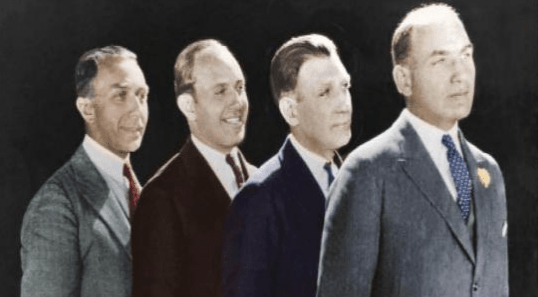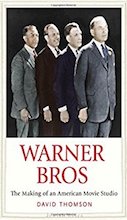The Making of an American Movie Studio
David Thomson is one of the greatest film historians, and at 191 pages of text, "Warner Bros" is a model of concision and precision. Yale University Press
Yale University Press
“Warner Bros: The Making of an American Movie Studio“
A book by David Thomson

Purchase in the Truthdig Bazaar
David Thomson wants readers to have no illusions about the central figure of “Warner Bros: The Making of an American Movie Studio.” Jack Warner was “maybe the biggest scumbag ever to get into a Jewish Lives series. … But being less than Einstein, Proust, or even Barbra Streisand didn’t stop Jack and Warner Bros. from having an impact on our culture and dreams, on us, that is alarming because it’s enormous.”
Thomson is one of the greatest film historians, and at 191 pages of text, “Warner Bros” is a model of concision and precision. A departure from other books in Yale’s Jewish Lives series, it’s not a biography of a single man or even four brothers, but of a studio. “They didn’t call themselves Paramount or Universal or Columbia, names from out of the clouds,” Thomson writes. “No, they said theirs was a family show, just the brothers. …”
Click here to read long excerpts from “Warner Bros” at Google Books.
The family Wonsal (or Wonskolaser) emigrated from an area of Poland under Russian control to Baltimore in the late 1880s and moved around, living in Canada (Jack, the youngest, was born in Ontario) and finally settling in Youngstown, Ohio. Harry, the oldest, “could read and write in Hebrew, while Jack struggled with English.” Jack, who would become the dominant force of the studio, “abandoned his own education for more pressing things before he was 12.”
One of those “pressing things” was movies. A founding myth of the family, propagated by all the Brothers Warner but particularly by Jack in his fanciful autobiography, “My First Hundred Years in Hollywood,” was how Sam bought a primitive movie projector and the entire family gathered to watch “The Great Train Robbery”—actually pieces of the film as the projector was not in perfect working order. They were enthralled by the artistry of the new medium and enticed by the business possibilities.
Though the four brothers—Harry, Abe, Sam and Jack—started the studio together, Jack, Thomson says, “was eager to be a show business person: this makes him awful in some ways, despised by many of his own employees. But he is irresistible, too, the showman in the family, the one who’s likely to tell the world, ‘You ain’t heard nothing yet!’”
Which, by the way, was the most enduring line in “The Jazz Singer,” the first feature-length sound picture and the first Warner Bros. blockbuster. The struggle to bring it to fruition was so great that, after Sam’s death, Jack “had no doubt—‘The Jazz Singer killed him,’ because of the way Sam had been in charge of that production and its struggle towards synchronized sound.” Sam died of complications from pneumonia the day before the film’s premiere in 1927.
In an astonishing array of films that worked their way into America’s collective unconscious, the Warners’ stories “taught immigrants English—and a thought of being American.”
To name just 30 of their most iconic films: “The Jazz Singer,” “The Public Enemy,” “Little Caesar,” “42nd Street,” “Gold Diggers of 1933,” “Baby Face,” “I’m a Fugitive From a Chain Gang,” “The Adventures of Robin Hood,” “Jezebel,” “Dark Victory,” “Sergeant York,” “Maltese Falcon,” “Casablanca,” “Now Voyager,” “Yankee Doodle Dandy,” “The Big Sleep,” “Of Human Bondage,” “Treasure of the Sierra Madre,” “Streetcar Named Desire,” “To Have and Have Not,” “White Heat,” “Strangers on a Train,” “A Star Is Born,” “The Searchers,” “Ocean’s Eleven,” “My Fair Lady,” “Bonnie and Clyde,” “East of Eden,” “Rebel Without a Cause” and “Days of Wine and Roses.”
Sift through that list and appreciate the amazing range of actors who starred in them: James Cagney, Edward G. Robinson, Barbara Stanwyck, Humphrey Bogart, Bette Davis (who Thomson says “is more important to this history than Cagney, just as she was a more radical screen presence”), James Dean, Marlon Brando and many others.
Among them they represent the spectrum of American acting in those years. Thomson is also generous to the equally brilliant but under celebrated female stars such as Joan Blondell, Ruby Keeler, and Ida Lupino.
Jack Warner was domineering, ruthless even, to those he owed part of his success to, and an egomaniac, but he was instrumental in bringing sound to cinema, reviving Alfred Hitchcock’s career (with “Strangers on a Train,” made after a few financial flops), and whether he appreciated it or not, he helped usher in method acting. He let John Huston go to Mexico to “shoot a yarn about chasing gold,” and despite his personal politics, which were often reactionary, his studio was ”the most socially conscious or leftist studio outside the Soviet Union.”
It’s hard to think of any definition of hero, from the ancient Greeks’ to Hollywood’s, that fits Jack Warner, but surely, like David Copperfield, he was at least the hero of his own story. Cagney despised him, Bogart didn’t trust him, Bette Davis sued him, and his brothers were alienated by him. His first star, Rin Tin Tin, probably growled at him. But without him, perhaps half the classics of the first 40 years of American movies would never have been made, and archetypal American characters such as Rin Tin Tin, Sam Spade, Rick Blaine, Mildred Pierce, Stanley Kowalski, Baby Jane and even Bugs Bunny might never have seen the silver light.
After Jack sold the studio in 1966, Warren Beatty visited him to screen “Bonnie and Clyde,” which Beatty starred in and produced. It was one of the last projects Warner had a hand in, and its violence shocked audiences in 1967, just as “The Public Enemy” had 36 years earlier. “The old man,” Thomson writes, “was unimpressed by the movie. … Beatty told him, ‘It’s an homage to Warners’ gangster films.’ And Jack fired back, ‘What the hell is an homage’?”
If the old man had understood what an homage was, he’d know that David Thomson’s “Warner Bros” is a fitting one.
Your support matters…Independent journalism is under threat and overshadowed by heavily funded mainstream media.
You can help level the playing field. Become a member.
Your tax-deductible contribution keeps us digging beneath the headlines to give you thought-provoking, investigative reporting and analysis that unearths what's really happening- without compromise.
Give today to support our courageous, independent journalists.






You need to be a supporter to comment.
There are currently no responses to this article.
Be the first to respond.